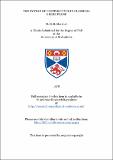The syntax of postpositives in classical greek prose
Abstract
Postpositives (in particular, aut-, u-, av, tls) , which do not stand in initial position, have a strong traditional tendency in early Greek word-order to stand in 'peninitial' (second) position; but by classical times this has been modified by frequent 'deferment' to later positions. The thesis is a preliminary to a study of the causes of deferment through comparison of peninitial and deferred instances in which the author has free choice between different word-orders, i.e. is constrained neither by rules associated with his dialect or period nor by habitual formulae. Rules, which reduce the number of 'possible' positions, are listed, and their exceptions studied, in Chapter Two, and Formulae, which may explain, by attraction to the position following particular words, individual cases of both peninitial position and deferment, in Chapter Three. In Chapter One, possible causes of deferment are discussed: 'unit-formation', 'colon-formation', 'formulaism', Comparison of passages in Homer and Herodotus suggests that in many cases these overlap, different causes reinforcing each other; this will make it difficult to eliminate the possibility that further causes may exist. Despite grounds for doubting that grammatical relations determine word-order, there are many cases where a deferred postpositive follows its most closely-related verb; it is revealed that the change from prevalence of peninitial position in Homer to deferment in Herodotus is accompanied more than anything else by an increase in the order verb--postpositive. This theme is continued in Chapter Two with the discovery in Rules XXIV ff. that not only does av not come later than directly after its verb but the others studied are similarly influenced by elements, verbal or substantial, to which they 'belong'; thus the problem of relations with the verb reduces in normal usage to two possibilities, either somewhere before or directly after; the latter is a primary phenomenon compatible with peninitial position but often causing deferment. The tables proving Rules XXV ff. reveal interesting patterns which may be stylometrically useful. In Chapter Four, the conclusions are summed up, and some applied to textual problems in the texts mainly studied (Thucydides, Plato, Demosthenes) and tentatively to detecting discrepancies of style in the spurious and suspected works of the Platonic corpus.
Type
Thesis, PhD Doctor of Philosophy
Collections
Items in the St Andrews Research Repository are protected by copyright, with all rights reserved, unless otherwise indicated.

